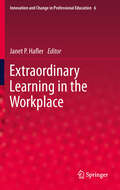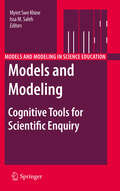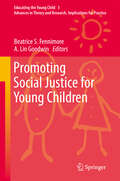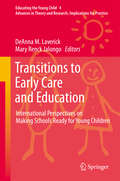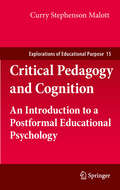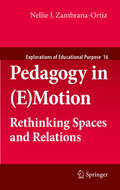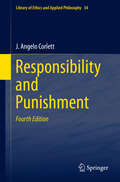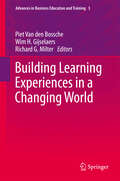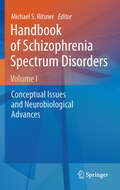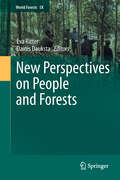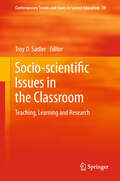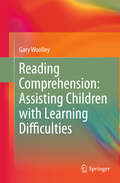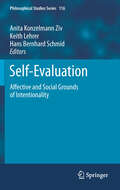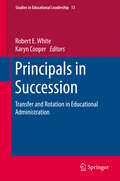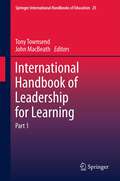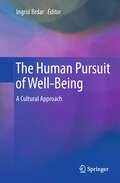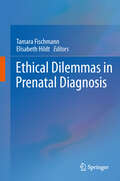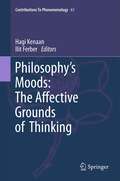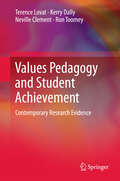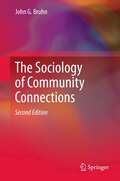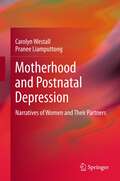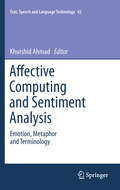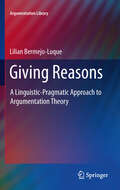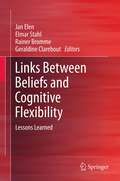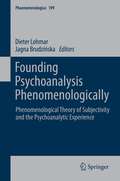- Table View
- List View
Extraordinary Learning in the Workplace
by Janet P. HaflerThe contributing authors of this multidisciplinary text agree that workplace learning truly is extraordinary when it is marked by structural congruence and a positive synergy among the intended and formal preparation of professionals, that tacit learning occurs within the hidden curriculum, and that the subsequent demands, both formal and tacit, are embedded in subsequent workplace settings. Thus, for this text, these authors explore research and practice literature related to curriculum, instruction and assessment of professionals' learning in the workplace and the implications for best practices. But what makes this book truly unique is that the authors examine that literature in the context of four professions--education, nursing, medicine and clergy--at the point of those professions wherein students are learning during the degree program stages of their education. Extraordinary Learning in the Workplace is broken into four main sections. Part I explores curriculum, both formal and hidden. Part II focuses on conceptions and theories of learning and instruction and is intended to inform the work of educators with regard to components of professional education that occur in the practice settings of the workplace. Part III covers assessment, using medicine as its example to argue that assessment has remained largely unchanged for years, thus making the multiple choice questions tests introduced in the 1950s the de facto gold standard for "quality" assessment. And Part IV focuses on the training of the instructors, visiting the three key themes of relationships, activities or tasks, and work practices.
Models and Modeling
by Issa M. Saleh Myint Swe KhineThe process of developing models, known as modeling, allows scientists to visualize difficult concepts, explain complex phenomena and clarify intricate theories. In recent years, science educators have greatly increased their use of modeling in teaching, especially real-time dynamic modeling, which is central to a scientific investigation. Modeling in science teaching is being used in an array of fields, everything from primary sciences to tertiary chemistry to college physics, and it is sure to play an increasing role in the future of education. Models and Modeling: Cognitive Tools for Scientific Enquiry is a comprehensive introduction to the use of models and modeling in science education. It identifies and describes many different modeling tools and presents recent applications of modeling as a cognitive tool for scientific enquiry.
Promoting Social Justice for Young Children
by Beatrice S. Fennimore A. Lin GoodwinThis book explores important current social justice issues that confront young children in America. A broad range of topics related to the fair treatment of young children and their families are approached with a fresh and hopeful energy. The central argument of this volume is that a fair and just society must protect the basic needs of all children so they are able to reach their full potential to learn, grow, and ultimately become productive democratic citizens. The book includes contributions from an impressive group of authors who have been consistent voices for the fair and equitable treatment of children in school and society. Each chapter examines a critical issue in child social justice with a focus on the current problem, historical importance of the issue, potential solutions, and a vision for the future. The book has been developed to reach a wide audience of professionals whose work involves children and who have grown concerned about social forces that cause child suffering and threaten the well-being or even the survival of children in the United States. Readers will come away with up to date information and a renewed commitment to being life-long advocates for children.
Transitions to Early Care and Education
by Mary Renck Jalongo Deanna M. LaverickTransitions to new educational experiences are a universal rite of passage encountered by children worldwide. This volume in the Educating the Young Child: Advances in Theory and Research, Implications for Practice series provides early childhood educators with a resource that focuses on the transitions that young children make to early care and education settings, along with the issues that surround this important time in their lives. New experiences, such as the start of formal schooling, mark important and exciting events that also evoke different reactions from children and their families. The diverse experiences, traits, and needs exhibited by young children provide early childhood educators with what may be a potentially challenging role. With an international focus, the purpose of Transitions to Early Care and Education: International Perspectives on Making Schools Ready for Young Children is to communicate an enlarged view of the transition process in order to appreciate and honor the promise and potential of all children worldwide. Contributing to this volume are a group of distinguished researchers, practitioners, and educators in the field of early childhood education. Their collective expertise is shared with those who are committed to educating and caring for young children and the families they serve.
Critical Pedagogy and Cognition: An Introduction to a Postformal Educational Psychology (Explorations of Educational Purpose #15)
by Curry Stephenson MalottThis book simultaneously contributes to the fields of critical pedagogy and educational psychology in new and innovative ways by demonstrating how critical pedagogy, postformal psychology, and Enlightenment science, seemingly separate and distinct disciplines, are actually part of the same larger, contextualized, complex whole from the inner most developmentally-fixed biological context of human faculties to the perpetually shifting, socially and politically constructed context of individual schema and human civilization. The text's uniqueness stems from its bold attempt to connect the postformal critical constructivist/pedagogy work of Joe Kincheloe and others to Western science through a shared, although previously misunderstood, critique and rejection of crude forms of social control, which the psychologists call behaviorism and Western scientists identify as mechanical philosophy. This book therefore argues that critical pedagogy-- which includes, among others, anarchist, Marxist, feminist, Indigenous (globally conceived), Afro-Caribbean/American, and postmodern traditions--and critical/constructivist educational psychology have much to gain by engaging previously rejected work in critical solidarity, that is, without compromising one's values or democratic commitments. The goal of this book is therefore to contribute to this vision of developing a more transgressive and transformational educational psychology.
Pedagogy in (E)Motion
by Nellie J. Zambrana-OrtizThis personal, creative, critical work from a leading scholar of psychology is rooted in three novel concepts and aims to share critical pedagogy in the spirit of nascent potential found in the context of a colonial Puerto Rico. First comes the idea of 'pedagogy in (e)motion', or the emotional matrix of the teaching and learning process. Secondly, the author explores the notion of 'street pedagogy' as a genuine and powerful professional tool. And thirdly, the book underscores what Zambrana-Ortiz calls 'the interconnection of the artscience within the political and biographical act of teaching'. The purpose is to inform education teaching practice with the radical framework that, like the neurosciences, believes emotions to be a vital precursor to the planning of action, the process of decision-making and the broadening of our cognitive parameters. The chapters focus on different and yet complementary dimensions of a college teaching initiative boasting a unique interplay between a transgressive narrative, reinvented methodology and authentic samples of students' contributions to the project. Traditionally, emotional and visceral experiences have been downplayed and rejected as fundamental components of knowledge. This book makes the case for their reinstatement, and proposes that the pleasure and commitment of teaching itself can be seen as resistance given the challenging social and political context, the bureaucracy of the Puerto Rican higher education system, and the cynicism of the self-confessed cognoscenti who think that little political progress can come from within the university system. Such resistance has proved for the author a source of inspiration and has contributed to her creation and reconceptualization of approaches to critical and useful pedagogy. D edication To my students who inspire many stories and provoke many emotions and challenge my capacities... To Aura, Ignacio and Jaime for their unconditional love and their everyday lessons... A cknowledgments Many friends, mentors and colleages from the University of Puerto Rico and United States were very important pieces to my creative work. Thanks to Donaldo Macedo who encouraged the initial proposal and to Joe Kincheloe for accepting it and bringing guidance in the right moment. Colleages like Roamé Torres and Angeles Molina, from their directive positions, were extremely supportive while Sandra Macksoud, José Solís, Pedro Subirats, and Ada Prabhavat gave me guidance and constant insights in editing and translation, as well as crucial material for my narrative. Juan Vadi enhanced my graphic elements with his talent; while college mentors, current colleages, teachers, and former graduate and undergraduate students allowed me to write their stories and reflections binging fresh accents and life to the book. Thanks for ever!
Responsibility and Punishment
by J. Angelo CorlettThis volume provides discussions of both the concept of responsibility and of punishment, and of both individual and collective responsibility. It provides in-depth Socratic and Kantian bases for a new version of retributivism, and defends that version against the main criticisms that have been raised against retributivism in general. It includes chapters on criminal recidivism and capital punishment, as well as one on forgiveness, apology and punishment that is congruent with the basic precepts of the new retributivism defended therein. Finally, chapters on corporate responsibility and punishment are included, with a closing chapter on holding the U. S. accountable for its most recent invasion and occupation of Iraq. The book is well-focused but also presents the widest ranging set of topics of any book of its kind as it demonstrates how the concepts of responsibility and punishment apply to some of the most important problems of our time. "This is one of the best books on punishment, and the Fourth Edition continues its tradition of excellence. The book connects punishment importantly to moral responsibility and desert, and it is comprehensive in its scope, both addressing abstract, theoretical issues and applied issues as well. The topics treated include collective responsibility, apology, forgiveness, capital punishment, and war crimes. Highly recommended. "--John Martin Fischer, Distinguished Professor of Philosophy, University of California, Riverside.
Building Learning Experiences in a Changing World (Advances in Business Education and Training #3)
by Wim H. Gijselaers Piet Van den Bossche Richard G. MilterAdvances in Business Education & Training is a Book Series to foster advancement in the field of Business Education and Training. It serves as an international forum for scholarly and state-of-the-art research and development into all aspects of Business Education and Training. This new volume deals with several aspects of the challenge to design learning in and for a changing world. The first part concerns program development. How to build curricula that are future-proof? Principles to innovate our curricula are identified. It answers the question how we can incorporate the need for change in our thinking about curriculum-development and identify the necessary elements to incorporate in our curricula. The second part focuses on the increasing diversity of students and employees within our schools and organizations, in terms of culture, language, and perception of ability, gifts, and talents. This offers a range of opportunities, but at the same time can possibly jeopardize some processes that are taken for granted. Chapters in this part analyze the processes that play a crucial role in dealing with this diversity and identify educational practices that can help to harvest the potential that lies within this diversity. The third part of this book digs further into the possibilities that are opened up by the implementation of ICT-support in our learning environments. E-learning provides tools to adapt these environments to the needs of an increasingly diverse student-population. In the last part we focus specifically on the workplace and how learning can be designed in such a way that employees are equipped for a shifting workplace. On the one hand it is looked how training can affect performance in the workplace. Does learning transfer to the work environment? On the other hand it is questioned how one can design affordances to trigger learning in the workplace.
Handbook of Schizophrenia Spectrum Disorders, Volume II
by Michael S. RitsnerA few disorders have some of the same symptoms as schizophrenia including schizoaffective disorders, schizophreniform disorder, schizotypal and schizoid personality disorders, delusional disorder, and autism (schizophrenia spectrum disorders). Since the 2000 there has been significant progress in our understanding of the early presentations, assessment, suspected neuropathology, and treatment of these disorders. Recent technological breakthroughs in basic sciences hold promise for advancing our understanding of the pathophysiology of schizophrenia spectrum disorders. This collective monograph reviewers recent researches regarding the origins, onset, course, and outcome of schizophrenia spectrum disorders. In particular, this book will be illustrate new developments in terms of conceptual models, and research methodology, genetics and genomics, brain imaging and neurochemical studies, neurophysiology and information processing in schizophrenia spectrum disorders patients. Also will be highlighted new developments in our understanding of the childhood psychosis, prodromal and first-episode states, in treatment and rehabilitation. Thus, the purpose of this book is to provide up-to-date overview of the rapid advances made in the clinical and basic science studies supporting our understanding of the relationship between cerebral processes and clinical, cognitive and other presentations of the schizophrenia spectrum disorders. In addition, this book aims to monitor important research developments, which may be relevant to treatment, and rehabilitation of patients.
New Perspectives on People and Forests
by Dainis Dauksta Eva RitterThe aim of this book is to elucidate the role of forests as part of a landscape in the life of people. Most landscapes today are cultural landscapes that are influenced by human activity and that in turn have a profound effect on our understanding of and identification with a place. The book proposes that a better understanding of the bond between people and forests as integrated part of a landscape may be helpful in landscape planning, and may contribute to the discussion of changes in forest cover which has been motivated by land use changes, rural development and the global climate debate. To this end, people's perception of forest landscapes, the reasons for different perceptions, and future perspectives are discussed. Given the wide range of forest landscapes, and cultural perspectives which exist across the world, the book focuses on Europe as a test case to explore the various relationships between society, culture, forests and landscapes. It looks at historical evidence of the impacts of people on forests and vice versa, explores the current factors affecting people's physical and emotional comfort in forest landscapes, and looks ahead to how changes in forest cover may alter the present relationships of people to forests. Drawing together a diverse literature and combining the expertise of natural and social scientists, this book will form a valuable reference for students and researchers working in the fields of landscape ecology and landscape architecture, geography, social science, environmental psychology or environmental history. It will also be of interest to researchers, government agencies and practitioners with an interest in issues such as sustainable forest management, sustainable tourism, reserve management, urban planning and environmental interpretation.
Socio-scientific Issues in the Classroom
by Troy D. SadlerSocio-scientific issues (SSI) are open-ended, multifaceted social issues with conceptual links to science. They are challenging to negotiate and resolve, and they create ideal contexts for bridging school science and the lived experience of students. This book presents the latest findings from the innovative practice and systematic investigation of science education in the context of socio-scientific issues. Socio-scientific Issues in the Classroom: Teaching, Learning and Research focuses on how SSI can be productively incorporated into science classrooms and what SSI-based education can accomplish regarding student learning, practices and interest. It covers numerous topics that address key themes for contemporary science education including scientific literacy, goals for science teaching and learning, situated learning as a theoretical perspective for science education, and science for citizenship. It presents a wide range of classroom-based research projects that offer new insights for SSI-based education. Authored by leading researchers from eight countries across four continents, this book is an important compendium of syntheses and insights for veteran researchers, teachers and curriculum designers eager to advance the SSI agenda.
Reading Comprehension
by Gary WoolleyReading Comprehension: Assisting Children with Learning Difficulties examines the complex nature of reading comprehension. It introduces a model for classifying reading comprehension based on an expanded Simple View of Reading. Issues related to assessment, diagnosis, and remediation of reading comprehension difficulties are discussed and translated into clear recommendations to inform reading intervention design and practice. It gives an informed understanding as to why reading comprehension is difficult for some children with learning disabilities such as ADHD, autism, language difficulties and dyslexia. From leading literacy research, the book develops a deeper understanding of thinking processes that facilitate comprehension at the word, discourse, and metacognitive levels. Children will benefit from the introduction of evidence-based methods for teaching reading comprehension using structured multiple-strategy frameworks.
Self-Evaluation
by Hans Bernhard Schmid Keith Lehrer Anita Konzelmann ZivThe book contains contributions by leading figures in philosophy of mind and action, emotion theory, and phenomenology. As the focus of the volume is truly innovative we expect the book to sell well to both philosophers and scholars from neighboring fields such as social and cognitive science. The predominant view in analytic philosophy is that an ability for self-evaluation is constitutive for agency and intentionality. Until now, the debate is limited in two (possibly mutually related) ways: Firstly, self-evaluation is usually discussed in individual terms, and, as such, not sufficiently related to its social dimensions; secondly, self-evaluation is viewed as a matter of belief and desire, neglecting its affective and emotional aspects. The aim of the book is to fill these research lacunas and to investigate the question of how these two shortcomings of the received views are related.
Principals in Succession
by Robert E. White Karyn CooperContributors to this volume examine structures and processes that school boards have in place directly relating to the process of principal or vice-principal succession. As well, they consider the effect that these structures and processes have upon staff and administrators themselves. These contributors investigate policies, procedures and practices that school boards employ in terms of leadership succession, and explore implications of these constructs for the sustainability of school improvement. This volume presents an overview of the process of principal or vice-principal succession, descriptions of school district practices surrounding this process and discussions regarding how succession procedures affect individuals and groups of individuals. This volume also highlights those board policies that incorporate practices used to develop models that support and allow administrators to succeed. It articulates how school leaders and staff members deal with change and improvement efforts in successive schools, as well as how board policies and practices support principals and vice-principals at any stage in the succession process. This volume is useful as a reference guide relating to transfer and rotation procedures in school systems across the nation.
International Handbook of Leadership for Learning
by John Macbeath Tony TownsendThe International Handbook of Leadership for Learning brings together chapters by distinguished authors from thirty-one countries in nine different regions of the world. The handbook contains nine sections that provide regional overviews; a consideration of theoretical and contextual aspects; system and policy approaches that promote leadership for learning with a focus on educating school leaders for learning and the role of the leader in supporting learning. It also considers the challenge of educating current leaders for this new perspective, and how leaders themselves can develop leadership for learning in others and in their organisations, especially in diverse contexts and situations. The final chapter considers what we now know about leadership for learning and looks at ways this might be further improved in the future. The book provides the reader with an understanding of the rich contextual nature of learning in schools and the role of school leaders and leadership development in promoting this. It concludes that the preposition 'for' between the two readily known and understood terms of 'leadership' and 'learning' changes everything as it foregrounds learning and complexifies, rather than simplifies, what that word may mean. Whereas common terms such as 'instructional leadership' reduce learning to 'outcomes', leadership for learning embraces a much wider, developmental view of learning.
The Human Pursuit of Well-Being
by Ingrid BrdarThis book brings together the latest research on positive psychology from an international cast of researchers and particularly from the growing body of European researchers. The chapters describe research and practice from diverse fields of positive psychology, covering topics such as happiness and well-being, motivation and goals, personality, academic performance and coping, measurement and interventions. The book emphasizes a cultural approach to the human pursuit of well-being. It is unique in that it presents research from a range of cultures, such as Russia, Croatia, and Egypt, in addition to ten different Western cultures. This approach helps broaden our understanding of those aspects of human experience that make life worth living in diverse cultural conditions. The book includes well-known and new authors from the field and contains selected papers that were presented at the 4th European Conference of Positive Psychology held in 2008 in Croatia.
Ethical Dilemmas in Prenatal Diagnosis
by Elisabeth Hildt Tamara FischmannTechnological developments in the life sciences confront us with new facets of a Faustian seduction. Are we "playing God" more and more, as claimed by critical authors of modernity? Achievements in genetic research produce ethical dilemmas which need to be the subject of reflection and debate in modern societies. Denial of ambivalences that ethical dilemmas arouse constitutes a threat to societies as well as to individuals. The book presents a compilation of some of the results of the interdisciplinary European study "Ethical Dilemmas Due to Prenatal and Genetic Diagnostics" (EDIG), which investigated some of these dilemmas in detail in a field which is particularly challenging: prenatal diagnosis. When results from prenatal diagnosis show fetal abnormalities, women and their partners are confronted with ethical dilemmas regarding: the right to know and the right not to know; decision-making about the remainder of the pregnancy and the desire for a healthy child; responsibility for the unborn child, for its well-being and possible suffering; life and death. This book provides answers from an ethical, psychoanalytical and medical viewpoint.
Philosophy's Moods: The Affective Grounds of Thinking
by Hagi Kenaan Ilit FerberPhilosophy's Moods is a collection of original essays interrogating the inseparable bond between mood and philosophical thinking. What is the relationship between mood and thinking in philosophy? In what sense are we always already philosophizing from within a mood? What kinds of mood are central for shaping the space of philosophy? What is the philosophical imprint of Aristotle's wonder, Kant's melancholy, Kierkegaard's anxiety or Nietzsche's shamelessness? Philosophy's Moods invites its readers to explore the above questions through diverse methodological perspectives. The collection includes twenty-one contributions by internationally renowned scholars as well as younger and emerging voices. In pondering the place of the subjective and personal roots that thinking is typically called to overcome, the book challenges and articulates an alternative to a predominant tendency in philosophy to view the theoretical content and the affective side of thought as opposed to one another.
Values Pedagogy and Student Achievement
by Terence Lovat Kerry Dally Neville Clement Ron ToomeyUnder the weight of a combination of forces, many of the older paradigms of learning are being questioned in our time. Among the updated research that elicits such critique is that which deals directly with effective pedagogy, clearly illustrating the enhanced effects on learning when it is dealt with as a holistic developmental enterprise rather than one concerned solely with content, technique and measurable outcomes. This research includes volumes of empirical evidence and conceptual analysis from across the globe that point to the inextricability of values as lying at the heart of those forms of good practice pedagogy that support and facilitate the species of student achievement that truly does transform the life chances of students. This research indicates that the combination of values rich learning environments and values discourse (that is, the holism of implicit and explicit pedagogy) has potential for positive influence on learning outcomes, most markedly for those deemed likely to fail without such pedagogical intervention. Values Pedagogy and Student Achievement - Contemporary Research Evidence uncovers, explores and appraises those volumes of evidence and analysis, illustrating their pertinence to student achievement, the vexed issue that lies at the heart of all for which education stands.
The Sociology of Community Connections
by John G. BruhnMany of our current social problems have been attributed to the breakdown or loss of community as a place and to the fragmentation of connections due to an extreme value of individualism in the Western world, particularly in the United States. Not all scholars and researchers agree that individualism and technology are the primary culprits in the loss of community as it existed in the middle decade of the 20th century. Nonetheless, people exist in groups, and connections are vital to their existence and in the daily performance of activities. The second edition of the Sociology of Community Connections will identify and help students understand community connectedness in the present and future.
Motherhood and Postnatal Depression
by Pranee Liamputtong Carolyn WestallGlobally, postnatal depression (PND) is a growing public health problem. PND affects 10 to 15% of women in Western society. It caused by a combination of biological, psychological and social factors. Two models have attempted to define and explain PND; the biomedical and the sociological models. The traditional biomedical model views PND as a medical condition which implies there is individual pathology and abnormality. Whilst the biomedical model has been the dominant model in treating PND, it has been criticized by feminist sociologists and psychologists for its rigidity in defining and explaining PND. In contrast, the psychosocial model of health acknowledges the biological factors that impact on emotional well-being, but places more emphasis on the personal and social factors that impact on emotional well-being, but places more emphasis on the personal and social factors that contribute to depressive symptoms such as gender, poverty, social disadvantage and social class. The central argument throughout this book is the importance of support before and after the birth for women's emotional well-being. This book will also include women's journeys through pregnancy, childbirth, motherhood, postnatal depression, and resolution. To date, literature has focused on women's lived experiences of PND rather than their personal journeys through pregnancy, childbirth and early motherhood. Additionally, the adjustment to fatherhood has received less attention. For example, little is known about the impact of postnatal depression on the partner, what support partners offer when women with the intention to fill the gap in knowledge of cultural and social issues relating to pregnancy, childbirth, and motherhood for woman who were diagnosed with, and had resolved, PND.
Affective Computing and Sentiment Analysis: Emotion, Metaphor and Terminology (Text, Speech and Language Technology #45)
by Khurshid AhmadThis volume maps the watershed areas between two 'holy grails' of computer science: the identification and interpretation of affect - including sentiment and mood. The expression of sentiment and mood involves the use of metaphors, especially in emotive situations. Affect computing is rooted in hermeneutics, philosophy, political science and sociology, and is now a key area of research in computer science. The 24/7 news sites and blogs facilitate the expression and shaping of opinion locally and globally. Sentiment analysis, based on text and data mining, is being used in the looking at news and blogs for purposes as diverse as: brand management, film reviews, financial market analysis and prediction, homeland security. There are systems that learn how sentiments are articulated. This work draws on, and informs, research in fields as varied as artificial intelligence, especially reasoning and machine learning, corpus-based information extraction, linguistics, and psychology.
Giving Reasons
by Lilian Bermejo LuqueThis book provides a new, linguistic approach to Argumentation Theory. Its main goal is to integrate the logical, dialectical and rhetorical dimensions of argumentation in a model providing a unitary treatment of its justificatory and persuasive powers. This model takes as its basis Speech Acts Theory in order to characterize argumentation as a second-order speech act complex. The result is a systematic and comprehensive theory of the interpretation, analysis and evaluation of arguments. This theory sheds light on the many faces of argumentative communication: verbal and non-verbal, monological and dialogical, literal and non-literal, ordinary and specialized. The book takes into consideration the major current comprehensive accounts of good argumentation (Perelman's New Rhetoric, Pragma-dialectics, the ARG model, the Epistemic Approach) and shows that these accounts have fundamental weaknesses rooted in their instrumentalist conception of argumentation as an activity oriented to a goal external to itself. Furthermore, the author addresses some challenging meta-theoretical questions such as the justification problem for Argumentation Theory models and the relationship between reasoning and arguing.
Links Between Beliefs and Cognitive Flexibility
by Geraldine Clarebout Elmar Stahl Jan Elen Rainer BrommeWith the world and its structures becoming ever more complex, and the nature of future employment becoming ever more unpredictable, the notion of 'cognitive flexibility' has a high profile in educational and psychological debate. The contributions in this volume analyze the nature of cognitive flexibility, as well as the impact of different types of beliefs on cognitive flexibility. Making adequate decisions requires considering input from a variety of continuously evolving sources rather than adhering to predetermined procedures. Adopting a position in a debate necessitates the critical evaluation of different alternatives, while solving a problem entails selecting appropriate problem-solving strategies. Meanwhile, studying requires students to integrate a range of interventions, and treating a patient involves making a differential diagnosis. The common factor, cognitive flexibility, lies at the core of effective functioning in complex, domain-specific environments. Cognitive flexibility can be described as the disposition to consider diverse information elements while deciding on how to solve a problem or to execute a learning-related task in a variety of domains. The concept of 'disposition' implies that individuals will not always demonstrate cognitive flexibility even if they are in principle able to act in a cognitively flexible way. The notion does not require that alternatives are always deliberately considered, which is why this volume's tandem discussion of beliefs is key element of the discussion. Beliefs play a central role in cognitive flexibility and relate to what individuals consider to be important, valid and/or true. Of specific interest is the relationship between epistemological beliefs and cognitive flexibility, especially as a particular subset of epistemological beliefs seems to be a prerequisite to a cognitively flexible disposition.
Founding Psychoanalysis Phenomenologically
by Dieter Lohmar Jagna BrudzinskaThe present anthology seeks to give an overview of the different approaches to establish a relation between phenomenology and psychoanalysis, primarily from the viewpoint of current phenomenological research. Already during the lifetimes of the two disciplines' founders, Edmund Husserl (1859 - 1938) and Sigmund Freud (1856 - 1939), phenomenological and phenomenologically inspired authors were advancing psychoanalytic theses. For both traditions, the Second World War presented a painful and devastating disruption of their development and mutual exchange. During the postwar period, phenomenologists, especially in France, revisited psychoanalytic topics. Thus, in the so-called second generation of phenomenology there developed an intensive reception of the psychoanalytic tradition, one that finds its expression even today in current hermeneutic, postmodern and poststructuralist conceptions. But also in more recent phenomenological research we find projects concentrated systematically on psychoanalysis and its theses. In this context, the status of psychoanalysis as a science of human experience is discussed anew, now approached on the 'first person' basis of a phenomenological understanding of subjective experience. In such approaches, phenomena like incorporation, phantasy, emotion and the unconscious are discussed afresh. These topics, important for modern phenomenology as well as for psychoanalysis, are examined in the context of the constitution of the human person as well as of our intersubjective world. The analyses are also interdisciplinary, making use of connections with modern medicine, psychiatry and psychotherapy. The systematic investigations are enriched by historical analysis and research in the internal development of the disciplines involved. The volume presents recent work of internationally recognized researchers - phenomenologically oriented philosophers, psychoanalysts and psychotherapists - who work in the common field of the two disciplines. The editors hope that this selection will encourage further systematic collaboration between phenomenology and psychoanalysis
